Fishing Can’t Cure Cancer… But It Can Definitely Ease the Symptoms
- 28/08/2024
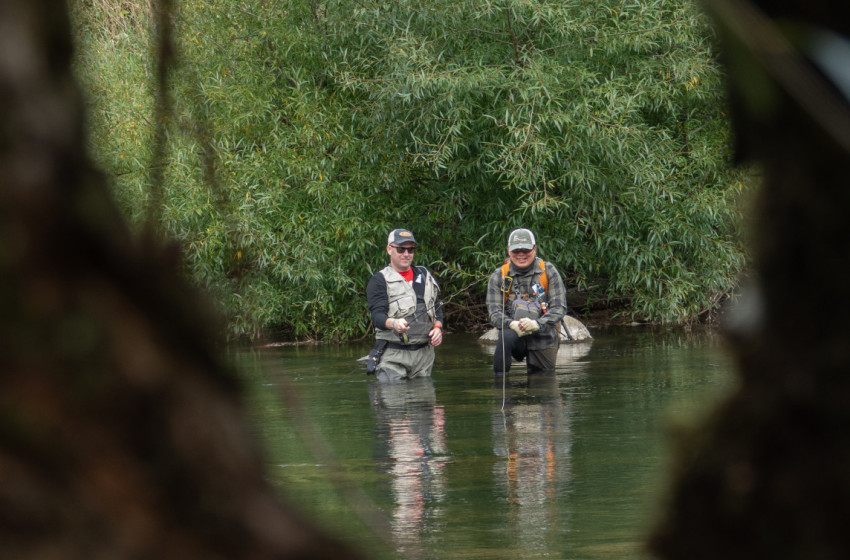
Colin Tan guides Alan Page on the Mangawhero
By Paul Catmur
Although fly fishing has many benefits, it has yet to be recognised by medical professionals as a cure for cancer. Despite this, it seems possible that a beautiful setting, a gentle skill, and the tranquillity of the river can make the process of dealing with a life-threatening disease somewhat more bearable, if only for a couple of days.
At least that’s the theory behind Reel Recovery, a fishing retreat for cancer sufferers which started in America and has for the last few years taken place twice a year in New Zealand. Accommodation, food, equipment and instruction is generously provided to cancer sufferers who would appreciate a break on the river.
Having prostate cancer myself, I had previously felt the benefit of a retreat weekend, and this year I repeated the journey down to report on the weekend at Raetihi in late summer for Fish & Game.
It’s a long drive down from north of Auckland to the lodge at Raetihi, so I was quite happy to pick up some company at a rendezvous in Cambridge. My passenger, Alan, was coming down as a participant and the next few hours flew by as we swapped notes about our time spent within the New Zealand health system dealing with our own personal cancer issues, while trying to avoid eating too many lollies.
It turned out that Alan wasn’t just car-pooling to save petrol, his brain tumour was considered too much of a risk to allow him to drive. In fact, his cancer was so far advanced that he had recently been advised to start building memories for his family and to get his affairs in order. A few weeks later he had a second opinion which suggested things weren’t nearly so bad and that recovery could be possible. With a background of that emotional rollercoaster, a couple of days on the water messing around with fish would hopefully provide a degree of respite.
When we arrived at the lodge we were met by the support crew and the other participants who had come from across the North Island. The Reel Recovery retreats, like most fishing weekends, are a mixture of fishing and talking. The main difference is that there is no alcohol to hide behind, which means the level of discourse is slightly more serious than asking Mick to stop hogging the chips and deciding whether Pete casts more like a baby giraffe or a clapping seal.
After a cup of tea, the participants gathered as a group for the first time under a sun-dappled tree. These group sessions are called Courageous Conversations and as the guys talked, the usually closed world of Kiwi blokes and their feelings was gently eased open under the guidance of Paul, the invigilator. Gradually, with some gentle prodding, stories and experiences were shared.
I believe that surgeons and doctors should listen more to patients. In researching cancer I’ve watched many videos of medical conferences around the world, and there never seems to be any input from the people at the sharp end of the knife. Viewing cancer as a personal issue which effects everything in your life, as opposed to a disease which it is your job to cure, produces an entirely different perspective.
As the participants took it in turns to talk, we heard some harrowing stories. Grant had a double whammy. His primary diagnosis of bladder cancer was then added to by prostate cancer which his urologist saw very much as the secondary problem. Grant had tuberculosis injected into his bladder via the urethra (as much fun as it sounds). Apparently, TB can cure bladder cancer. Who knew? When this didn’t work, he had both his prostate and his bladder removed. He had definitely drawn one of the shortest straws of the group, but his stoicism and good humour was a strength to us all.
When Reg was first diagnosed with prostate cancer, like many his mind was racing with dark possibilities, but over time, like many, he achieved a sense of perspective and now treated it as a relatively minor irritation.
Kevin and Warren were both from north of Auckland and following prostate cancer surgery attended the ‘Prosfit’ class held at Orewa. This was organised by a nurse who held fitness and pelvic floor exercises which they spoke very highly of, not just for the fitness work but because of the comradery. Perhaps this will prove to be the new RSA.
The surgery for Don’s cancer had caused damage to his jawbone and he’d needed a graft from his thigh bone to help rebuild his mouth. Another tricky one, but again he got on admirably and coped with it.
Stuart was an outdoors type who had myeloma, a progressive form of blood cancer with debilitating effects. We were reminded that there’s no such thing as good or bad cancer, just whatever we were dealing with - and for some this was the first time they had shared their stories beyond their immediate families.
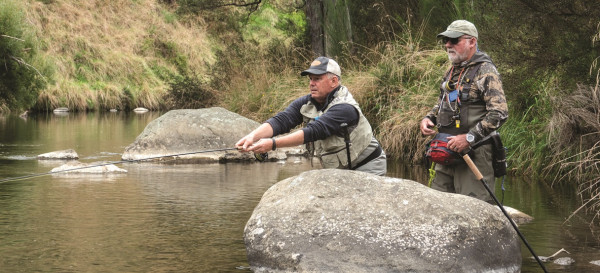
Mike Jarvie and John Pryer
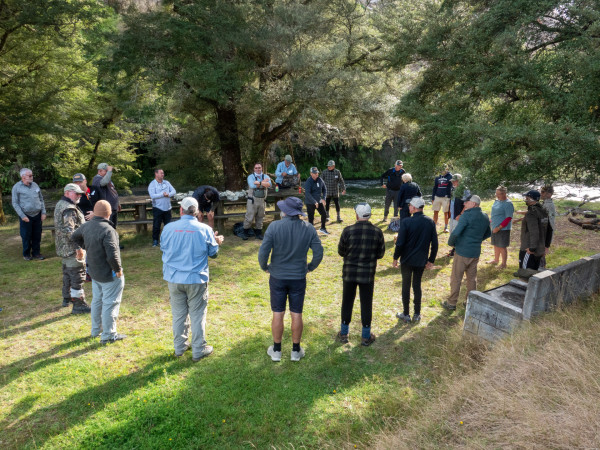
Riverside briefing from organiser Craig Caldwell
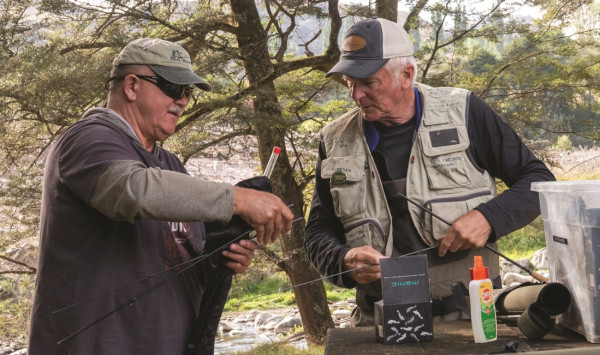
George Broklehurst gives Reg Ball some much needed tips
And so to the fishing... Each of the participants was teamed up with a ‘buddy’ who we met at breakfast the second day. The buddies are expert fly anglers who freely give their time and skill to help out with the weekend. The most important aspect of this was patience, which they all had in abundance. Although most of the participants had been saltwater fishing on a boat, knowledge of fly casting was almost negligible.
The scenery on the Mangawhero River was stunning with sheer cliffs backing on to the fast flowing boulder-strewn water. However, on that first day, fish were sadly absent. Leo, our excellent head chef had caught a beautiful brownie on the previous day’s recce, which had seemingly warned the others to keep their heads down. This gave the novices a chance to practice their casting unimpeded by any interference from annoying fish.
Still, spirits didn’t drop, and we returned to the lodge for another group session followed by an amazing spread for dinner. Leo cheekily suggested that as we hadn’t actually landed any fish that maybe I should write this article for Cuisine magazine instead of Fish & Game.
The next morning I sat in on the final Courageous Conversation. The sometimes damp eyes of the Friday night were replaced by raucous laughter. The subject was the same, but the attitudes had changed. The participants were relaxed, and problems had been shared, possibly even halved.
When we hit the river later that morning the fish were seemingly as reluctant as before. Then, finally, cheers spread through the retreat as Stuart and George returned with evidence of a glorious fish they’d snared. I’d been guided by George before, and he is a fantastic river companion. Here he’d guided Stuart gently through the process and Stuart had got his casting together enough to land the fly as instructed. The fish generously played its part, and it was as if, somehow, we all shared in that triumph
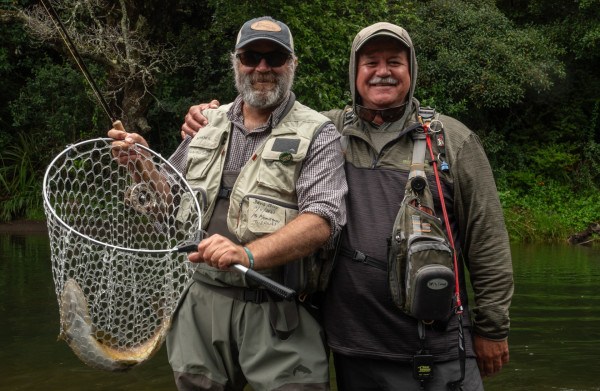
Stuart Edwards and George Brocklehurst rightly chuffed with their catch
After fishing and lunch there was a small ceremony where each participant was presented with a box of flies by their buddy. It’s a great gesture and hopefully some will take up the challenge to fish further. After all, it’s an easy one compared to the challenges they’ve already faced.
Just in case anyone might think this is potentially a little sexist, I should point out that there is a female equivalent of Reel Recovery, called Casting for Recovery. The driving force behind both these organisations is an empathetic and enthusiastic couple, Craig and Wendy Caldwell. Somehow, they manage to meld the fly-fishing community to help out and pull together this terrifically well-structured weekend.
If you, or anyone close to you, is suffering from cancer I can thoroughly recommend this weekend, whether or not you have any experience in fly fishing. Like me, I believe there are great benefits from sharing and hearing the stories of others while taking in some glorious scenery. And with a bit of luck, the fish might join in too.
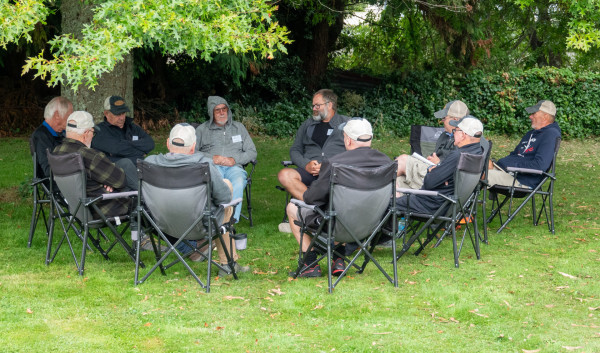
A courageous conversation under the trees
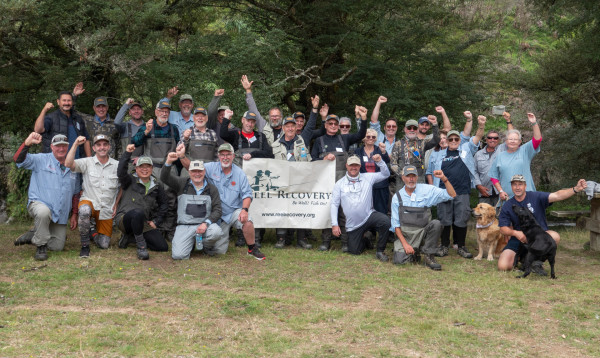
The gang celebrate a great weekend